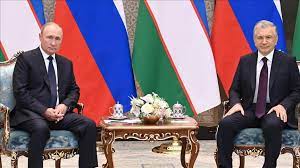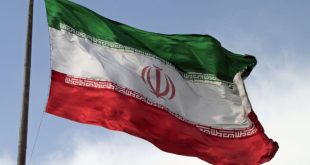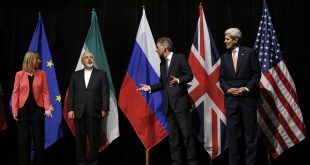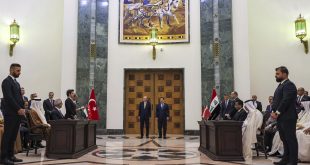In February 2023, Uzbekistani President Shavkat Mirziyoyev announced an energy package valued at over $1 billion to ease the country’s heating and electricity needs (Tashkent Times, February 8). In this, while Russia is considered a key player in providing Tashkent with much-needed oil and natural gas products, Uzbekistan also hopes to improve energy ties with its neighbors to avoid becoming overly dependent on Moscow.
In truth, situated in the heart of Central Asia, neighboring Afghanistan and with close proximity to Russia, Uzbekistan holds a key regional position. Furthermore, a large population coupled with abundant energy resources and gold mines make the country economically important for its neighbors. Uzbekistan, under President Shavkat Mirziyoyev, is seeking to carve out a bigger role in Central Asia in balancing against the bigger powers in the region—Russia, China and the United States (Iess.ir, January 20). Tashkent has been wary of becoming overly reliant on just one of these powers, aiming instead to try to play them off one another in the region. The primary aim of the Mirziyoyev regime’s foreign policy is to facilitate an independent sovereign state that can have a wider impact on global affairs. According to official documents released earlier this year, Uzbekistan reportedly aims to be a democratic state that has developed harmonious relations with its neighbors (Gov.uz, February 9).
Earlier, in July 2019, Mirziyoyev signed a decree in which he announced measures for establishing a more stable economy. The document also outlined a renewed commitment in ensuring the constant supply of household energy as well as the further development of Uzbekistan’s oil and gas industry. In the decree, Tashkent committed to improving the efficiency of fossil fuel exploration and making management of the industry more transparent (Tashkent Times, July 10). Partially because of these measures, in 2022, Uzbekistan’s economy grew by 5.7 percent. Specifically, industrial production grew by 5.2 percent, the construction industry by 6.6 percent and the service industry by 15.9 percent. Additionally, as compared to trade in 2021, Uzbekistan’s foreign trade grew by 18.6 percent in 2022 (Tashkent Times, January 30).
In January 2021, an Uzbekistani presidential decree on the “Year of Supporting Youth and Strengthening People’s Health” was published. As part of that decree, the Uzbekistani Ministry of Energy was tasked with implementing the necessary measures to develop a roadmap—or market mechanisms—necessary to bolster production capacities and rehabilitate existing gas fields. Therefore, starting on August 1, 2021, production factories in Uzbekistan received additional funds for purchasing electricity and gas imports as needed (Barghnews.com, February 10). Alexey Miller, CEO of Russian gas giant Gazprom, signed onto an agreement for cooperation with Uzbekistan’s energy sector, focusing on the development of new infrastructure to increase gas production (Interfax, January 25).
More recently, Uzbekistan has been in the midst of a severe energy crisis brought on by a growing population, aging infrastructure and limited natural resources. Additionally, the country relies on natural gas for 80 percent of its domestic electricity needs, which has been seriously hampered by Western sanctions on Russia. The announced energy package valued at over $1 billion aims to develop renewable energy sources in Uzbekistan to ease the crisis. Initial measures are focused on exploring the installation of solar panels on high-rise buildings, government institutions, industrial parks, parking facilities and water towers in Tashkent (Tashkent Times, February 8). The cold spell in December 2022 strained Uzbekistan’s energy supplies and led to mass outages across the country. As a result, measures are being actively taken to prevent a future crisis, including re-evaluating energy relations with the Kremlin.
For its part, since November 2022, Russia has continuously proposed the establishment of a tripartite gas union with Uzbekistan and Kazakhstan (see EDM, January 19). The Russian side has stipulated that the proposal does not mean supplying gas in exchange for political conditions but rather focuses on “coordinating commercial interests.” Yet, both Uzbekistan and Kazakhstan remain wary of such an arrangement, with Astana voicing concerns regarding the independence of its energy industry and Tashkent opting instead to consider relations on a bilateral basis.
Coming in at a total of $9.28 billion, the year 2022 saw a 23-percent increase in trade between Russia and Uzbekistan, according to the Uzbekistani State Committee of Statistics, with Russia becoming Uzbekistan’s largest trading partner. In the energy realm, in January 2023, Mirziyoyev and Russian President Vladimir Putin agreed to expand cooperation between the two countries, especially in developing new fuel and energy complexes (TASS, January 24). Furthermore, the two sides agreed to the delivery of increased volumes of Russian gas via the Central Asia–Center gas pipeline running through Kazakhstan (Central.asia-news.com, February 16). On March 3, Uztransgaz, Uzbekistan’s state-owned natural gas company, announced that final adjustments were being made on domestic energy infrastructure to accommodate the expected increase in Russian supplies (Eurasianet, March 3).
Russia’s expanded presence in Uzbekistan’s energy market will bring rewards for Moscow, not only in bringing in desperately needed export revenues but also in firming up relations with Tashkent. Yet, the Uzbekistani government remains keenly aware of the dangers in overdependence on Russia. As Tashkent-based economist Anvar Nazirov recently pointed out, “Russia is flagrantly meddling in the affairs of the Central Asian countries,” even pressuring Turkmenistan not to supply gas to Uzbekistan (Central.asia-news.com, February 16). As such, Tashkent is making the necessary arrangements to expand energy ties with its neighbors, establishing agreements with Turkmenistan, Kazakhstan and Kyrgyzstan to import more coal, natural gas and solar energy supplies.
Overall, it seems likely that Russia will increase its efforts to penetrate the energy markets of Central Asia as Moscow effectively reorients its industry eastward. In this, the impact of Western sanctions and Uzbekistan’s energy crisis on relations between Moscow and Tashkent has been significant. While Uzbekistan has turned to Russia for its energy needs in the short term, Tashkent is keen to deepen ties with other powers in the region, including China, over the longer term. This growing regional trend has led to a dramatic shift in the balance of power, with Russia losing its once dominant position. This has created tensions between Russia and Uzbekistan, with Moscow seeking to maintain its influence in the region by increasing investment and expanding trade ties. As the energy crisis in Uzbekistan continues, it remains to be seen if Tashkent can effectively manage energy relations with Moscow, or if the Kremlin will only further nurture Uzbekistan’s dependence.





